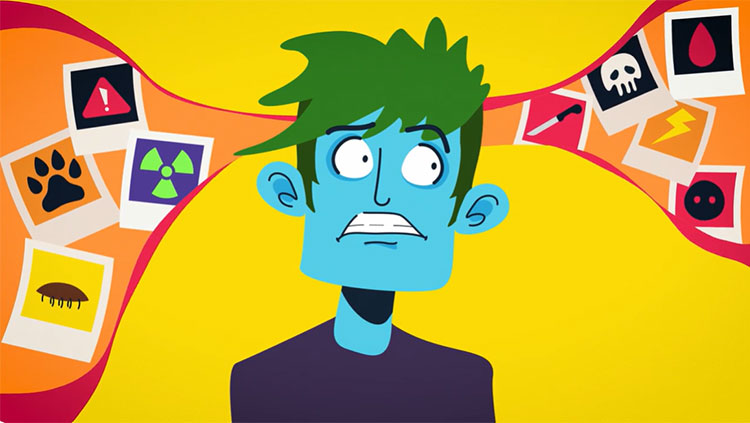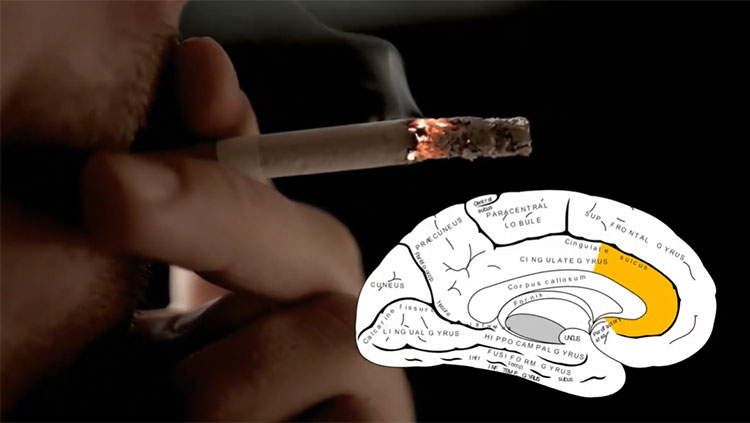A scary movie and a heavy college course load have something in common: They both can be stressful. But the brain’s response to those to stressors over time will differ. Acute stress, like seeing a scary movie or encountering a bear on a hike, can be a good thing: Our body’s stress response keeps us out of danger. But chronic stress can interfere with a variety of chemical messengers in the brain, affecting sleep, mood, appetite, and more.
This is a video from the 2022 Brain Awareness Video Contest.
Created by Jad Jabbour.
CONTENT PROVIDED BY
BrainFacts/SfN
Transcript
Brain Awareness Video Contest Transcript: Man’s Worst Friend by Jad Jabbour.
It is a Thursday evening. You are sitting on the couch, watching your favorite movie. The bag of popcorn right by your side and a nice drink. Nothing can ruin this relaxing moment.
Except that you have a three-page essay due tomorrow! You start to panic. How can I finish this essay? There is no way. I am going to fail. I don’t even have a topic. What do I do? Stop. Sit down and clear your mind because you are stressing.
Stress is the feeling we get when we experience pressure, tension, or any sort of change. Stress can happen mentally or physically. Examples of mental stress are anxiety, depression, panic attacks, feeling overwhelmed, and a lack of motivation.
Physical stress includes pains, aches, stomach problems, and exhaustion. We stress simply because our body is reacting to stress-causing factors called stressors. Stressors, like seeing a bee or a bear, will cause our body to be scared, or stressors like the essay that is due tomorrow will make us worried. We all have experienced stress.
If we all have experienced stress, does that mean our brains are unhealthy? Well, it depends on what type of stress we are talking about. There are two: chronic stress and acute stress.
Chronic stress occurs over a long period of time, such as an unhappy marriage. This is the bad type of stress that leads to severe problems in the heart and stomach, like high blood pressure, slow digestion, or even diabetes, but what does it do to the brain? Chronic stress negatively affects the activity of the brain’s chemical messengers, called neurotransmitters.
This causes problems with sleep, hunger, mood, happiness, and behavior. An example of one of the many neurotransmitters harmed by chronic stress is Gamma-aminobutyric acid, GABA for short.
The function of GABA is to produce a calming effect, making us relaxed and composed. Every neurotransmitter like GABA needs to be created and then transported in the brain in order for it to work. But chronic stress prevents this from happening. It reduces the enzyme that creates GABA (glutamic acid decarboxylase) and the protein that transports GABA (vesicular GABA transporter). With little creation and transportation of GABA, the low levels will cause the calmness to not be as effective, resulting in anxiety, depression, and insomnia.
Stress is not always bad, however. Acute stress is a good type of stress. It only happens for a short period of time, like an argument with your spouse, and it is helpful by allowing us to avoid dangerous situations.
For instance, recent studies suggest that if we experience acute stress while sick, the brain will trigger an abundance of white blood cells, boosting the immune system. Now we explained what goes on in the brain when chronic stress is present, but what about acute stress?
When acute stress is activated by a stressor, a team of organs, known as the stress-response system, work together to overcome this stress. It begins with a small almond-shaped structure located in the middle of the brain called the amygdala. The job of the amygdala is to detect the stress and tell the hypothalamus-pituitary-adrenal (HPA) axis to respond. This axis is a collection of two parts in the brain and one part near the kidneys that communicate with each other to respond to stress. First, the hypothalamus receives information from the amygdala and wakes up the pituitary gland. Then, the pituitary gland secretes adrenocorticotropic hormone (ACTH) into the adrenal glands. ACTH stimulates the release of cortisol, also a hormone.
Cortisol basically scares other organs, so it can be an issue if it is not maintained. That is where the prefrontal cortex comes into play. The prefrontal cortex reduces cortisol to ensure the brain does not get too stressed and that the body goes back to a normal, calm state.
Stress has a great impact over our everyday lives. It affects how we eat, sleep, and talk. The brain is fighting with stress every single day, so it is important we learn what stress is, how it affects us, and the brain.
Thank you.
Also In Emotions, Stress & Anxiety
Trending
Popular articles on BrainFacts.org
















